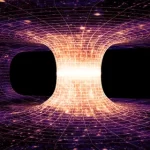Key Takeaways:
- The destination of black holes remains a profound mystery, as falling through an event horizon seems to lead to an unknown fate, with no possibility of communication back.
- The concept of black holes serving as wormholes or pathways to other galaxies or universes has been explored, but there is little evidence supporting the existence of such phenomena.
- The idea of black holes connecting to white holes, proposed by Russian cosmologist Igor Novikov, suggests a potential cycle of matter collapsing into black holes and then emerging from white holes, challenging traditional notions of black hole singularities.
- The “black hole information paradox” arises from Stephen Hawking’s proposition that black holes emit particles and radiation, leading to their eventual disappearance, erasing information. This notion conflicts with the principles of quantum theory.
- Recent studies propose alternative explanations, such as apparent horizons and soft hair around the event horizon, challenging the traditional understanding of black holes and suggesting that information may not be lost.
If one were to venture into a black hole, the question of where they might end up remains an enigma that has puzzled scientists for decades. As Professor Richard Massey from Durham University succinctly puts it, “Who knows?” The mysteries of black holes are profound, and the journey through an event horizon, the point of no return, raises questions about survival and the possibility of unraveling the secrets within.
According to Albert Einstein’s general theory of relativity, black holes emerge from the remnants of massive stars, forming an infinitely dense core known as a singularity. The gravitational forces within a black hole are so intense that not even light can escape, leading to the ominous concept of spaghettification for anything that crosses the event horizon.

The notion that black holes could serve as portals or wormholes to other galaxies gained traction over the years. Physicist Kip Thorne delved into the possibility in the 1980s, but skepticism persists, with no concrete evidence supporting the existence of such cosmic gateways. The inherent challenge lies in the inability to observe or photograph events inside a black hole, leaving the realm beyond the event horizon shrouded in mystery.
One intriguing proposition comes from Russian cosmologist Igor Novikov, suggesting a connection between black holes and white holes. In this theory, a black hole may link to a white hole in the past, creating a cyclical process where matter collapses into a black hole and emerges from a white hole. Recent studies by physicists Carlo Rovelli and Hal M. Haggard propose that black holes may transform into white holes upon their demise, challenging traditional beliefs about singularities.
The longstanding debate surrounding the “black hole information paradox” stems from Stephen Hawking’s assertion that black holes emit particles and radiation, ultimately leading to their disappearance and the loss of information. This conflicts with quantum theory, which posits that information cannot be destroyed. Recent studies applying loop quantum gravity offer alternative explanations, suggesting that black holes may serve as portals, with no loss of information.
The AMPS firewall hypothesis, proposed by physicists Ahmed Almheiri, Donald Marolf, Joseph Polchinski, and James Sully, introduces the concept of a quantum firewall at the event horizon, contradicting Einstein’s general theory of relativity. However, Hawking’s later work challenges the existence of an event horizon, proposing the idea of an “apparent horizon” that temporarily retains matter and energy before releasing them.
As the scientific community grapples with these paradoxes, new avenues of exploration continue to emerge. Recent studies hint at connections between evaporated black holes and dark matter, adding layers to the intricate web of cosmic mysteries. The concept of “soft hair” around the event horizon, as proposed by Hawking, further challenges established theories.
In essence, the destination of black holes remains elusive, with each proposed explanation opening new realms of inquiry. Whether black holes lead to other dimensions, white holes, or nowhere at all is a captivating puzzle that promises to occupy scientific minds for years to come.


